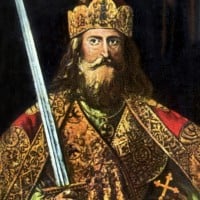Most Important Military Leaders of All Time
 Genghis Khan c. 1162 – August 18 1227, born Temüjin, was the founder and Great Khan of the Mongol Empire, which became the largest contiguous empire in history after his death.
Genghis Khan c. 1162 – August 18 1227, born Temüjin, was the founder and Great Khan of the Mongol Empire, which became the largest contiguous empire in history after his death. Classic warrior. Kill or be killed.
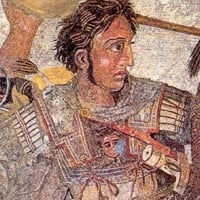 Alexander III of Macedon, commonly known as Alexander the Great, was a King of the Ancient Greek kingdom of Macedon and a member of the Argead dynasty.
Alexander III of Macedon, commonly known as Alexander the Great, was a King of the Ancient Greek kingdom of Macedon and a member of the Argead dynasty.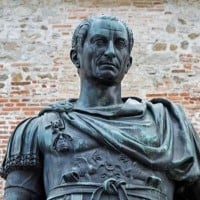 Gaius Julius Caesar, known by his cognomen Julius Caesar, was a Roman politician and military general who played a critical role in the events that led to the demise of the Roman Republic and the rise of the Roman Empire.
Gaius Julius Caesar, known by his cognomen Julius Caesar, was a Roman politician and military general who played a critical role in the events that led to the demise of the Roman Republic and the rise of the Roman Empire.
Maneuvers and tactics he made in Battle of Austerlitz, were unseen at that time. Maneuvering his cannons was like children playing with their toys. No doubt the greatest of all the times.
Important only in the sense that he provided an example of what NOT to do.
Only lost 3 battles in his career. The rest was a constant winning streak.
He conquered all of Europe.
 Hannibal, fully Hannibal Barca, was a Punic military commander from Carthage, generally considered one of the greatest military commanders in history.
Hannibal, fully Hannibal Barca, was a Punic military commander from Carthage, generally considered one of the greatest military commanders in history. Seeing Genghis Kahn, and Julius Ceasar before Hannibal? Brilliant tactician, battle of Cannae I don,t know.
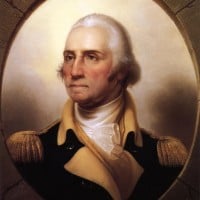 George Washington (February 22, 1732– December 14, 1799) was an American military officer, statesman, and Founding Father who served as the first president of the United States from 1789 to 1797. Appointed by the Continental Congress as commander of the Continental Army, Washington led the Patriot forces to victory in the American Revolutionary War and served as the president of the Constitutional Convention of 1787, which created the Constitution of the United States and the American federal government. Washington has been called the "Father of the Nation" for his manifold leadership in the formative days of the country.
George Washington (February 22, 1732– December 14, 1799) was an American military officer, statesman, and Founding Father who served as the first president of the United States from 1789 to 1797. Appointed by the Continental Congress as commander of the Continental Army, Washington led the Patriot forces to victory in the American Revolutionary War and served as the president of the Constitutional Convention of 1787, which created the Constitution of the United States and the American federal government. Washington has been called the "Father of the Nation" for his manifold leadership in the formative days of the country. William I, usually known as William the Conqueror and sometimes William the Bastard, was the first Norman King of England, reigning from 1066 until his death in 1087. The descendant of Viking raiders, he had been Duke of Normandy since 1035. After a long struggle to establish his power, by 1060 his hold on Normandy was secure, and he launched the Norman conquest of England in 1066. The rest of his life was marked by struggles to consolidate his hold over England and his continental lands and by difficulties with his eldest son.
William I, usually known as William the Conqueror and sometimes William the Bastard, was the first Norman King of England, reigning from 1066 until his death in 1087. The descendant of Viking raiders, he had been Duke of Normandy since 1035. After a long struggle to establish his power, by 1060 his hold on Normandy was secure, and he launched the Norman conquest of England in 1066. The rest of his life was marked by struggles to consolidate his hold over England and his continental lands and by difficulties with his eldest son.He fought the Muslims, without him, Europe would be muslim today.
 Dwight David "Ike" Eisenhower was an American politician and general who served as the 34th President of the United States from 1953 until 1961. He was a five-star general in the United States Army during World War II and served as Supreme Commander of the Allied Forces in Europe.
Dwight David "Ike" Eisenhower was an American politician and general who served as the 34th President of the United States from 1953 until 1961. He was a five-star general in the United States Army during World War II and served as Supreme Commander of the Allied Forces in Europe.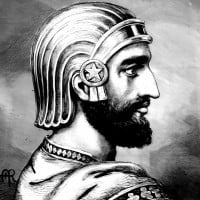
 Ulysses S. Grant was an American soldier and statesman who served as Commanding General of the Army and the 18th President of the United States, the highest positions in the military and the government of the United States.
Ulysses S. Grant was an American soldier and statesman who served as Commanding General of the Army and the 18th President of the United States, the highest positions in the military and the government of the United States.
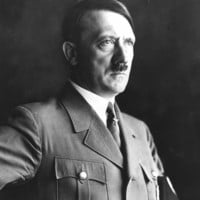 Adolf Hitler (April 20, 1889 - April 30, 1945) was a German politician of Austrian descent who served as the leader of the Nazi Party since 1921, Chancellor of Germany since 1933, and Führer of Nazi Germany since 1934. As dictator of Nazi Germany, he reversed the Treaty of Versailles, initiated World War II in Europe with the invasion of Poland in September 1939, and was a central figure of the Holocaust. He committed suicide two days before Soviet soldiers stormed his underground shelter in Berlin.
Adolf Hitler (April 20, 1889 - April 30, 1945) was a German politician of Austrian descent who served as the leader of the Nazi Party since 1921, Chancellor of Germany since 1933, and Führer of Nazi Germany since 1934. As dictator of Nazi Germany, he reversed the Treaty of Versailles, initiated World War II in Europe with the invasion of Poland in September 1939, and was a central figure of the Holocaust. He committed suicide two days before Soviet soldiers stormed his underground shelter in Berlin.

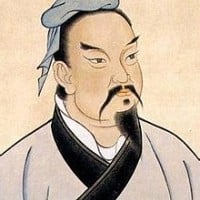 Sun Tzu was born June 16, 545 BC and died on January 6, 454 BC was a Chinese general, military strategist, writer, and philosopher who lived in the Eastern Zhou period of ancient China. Sun Tzu is traditionally credited as the author of The Art of War, an influential work of military strategy that has affected both Western and East Asian philosophy and military thinking.
Sun Tzu was born June 16, 545 BC and died on January 6, 454 BC was a Chinese general, military strategist, writer, and philosopher who lived in the Eastern Zhou period of ancient China. Sun Tzu is traditionally credited as the author of The Art of War, an influential work of military strategy that has affected both Western and East Asian philosophy and military thinking. Writing down the most basic rules of war, then you deserve a place among the greatest.
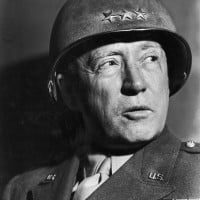 George Smith Patton Jr. was a General of the United States Army who commanded the U.S. Seventh Army in the Mediterranean theater of World War II, and the U.S. Third Army in France and Germany following the Allied invasion of Normandy in June 1944.
George Smith Patton Jr. was a General of the United States Army who commanded the U.S. Seventh Army in the Mediterranean theater of World War II, and the U.S. Third Army in France and Germany following the Allied invasion of Normandy in June 1944.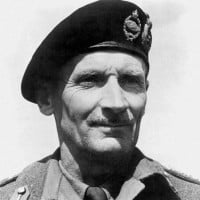
 Erwin Johannes Eugen Rommel, popularly known as the Desert Fox, was a German field marshal of World War II. He worked under Adolf Hitler's Third Reich as a leading general and gained fame from his battles in North Africa.
Erwin Johannes Eugen Rommel, popularly known as the Desert Fox, was a German field marshal of World War II. He worked under Adolf Hitler's Third Reich as a leading general and gained fame from his battles in North Africa. By far the most competent general of the Germans in WWII. Probably the best German one, although Von Moltke is on the same level.
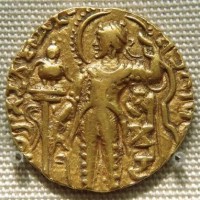
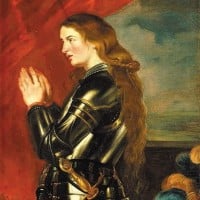 Joan of Arc, nicknamed "The Maid of Orléans", is considered a heroine of France for her role during the Lancastrian phase of the Hundred Years' War, and was canonized as a Roman Catholic saint.
St. Michael the Arch Angel and Sts. Catherine of Alexandria and Margaret of Antioch appeared to Joan and commanded her to save France from the onslaughts of the English.
Joan of Arc, nicknamed "The Maid of Orléans", is considered a heroine of France for her role during the Lancastrian phase of the Hundred Years' War, and was canonized as a Roman Catholic saint.
St. Michael the Arch Angel and Sts. Catherine of Alexandria and Margaret of Antioch appeared to Joan and commanded her to save France from the onslaughts of the English. Douglas MacArthur (January 26, 1880 – April 5, 1964) was an American Field Marshall and Five-Star General. He was Chief of Staff of the United States Army during the 1930's and played a significant role in the World War II Pacific Theatre. He received the Medal of Honor for his service in the Philippines Campaign, which made him and his father Arthur MacArthur Jr. the first father and son to be awarded the medal. He was one of only five to rise to the rank of General of the Army in the US Army, and the only one conferred the rank of field marshal in the Philippine Army.
Douglas MacArthur (January 26, 1880 – April 5, 1964) was an American Field Marshall and Five-Star General. He was Chief of Staff of the United States Army during the 1930's and played a significant role in the World War II Pacific Theatre. He received the Medal of Honor for his service in the Philippines Campaign, which made him and his father Arthur MacArthur Jr. the first father and son to be awarded the medal. He was one of only five to rise to the rank of General of the Army in the US Army, and the only one conferred the rank of field marshal in the Philippine Army.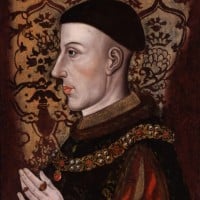
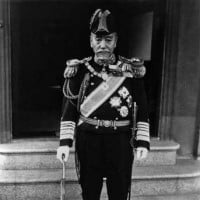
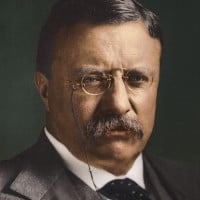 Theodore Roosevelt was an American statesman, author, explorer, soldier, naturalist, and reformer who served as the 26th President of the United States from 1901 to 1909. As a leader of the Republican Party during this time, he became a driving force for the Progressive Era in the United States in the early 20th century.
Theodore Roosevelt was an American statesman, author, explorer, soldier, naturalist, and reformer who served as the 26th President of the United States from 1901 to 1909. As a leader of the Republican Party during this time, he became a driving force for the Progressive Era in the United States in the early 20th century.